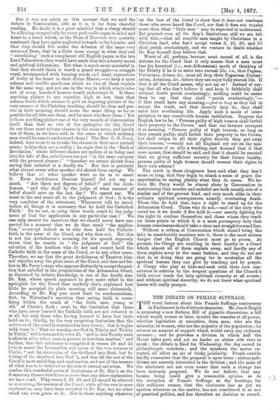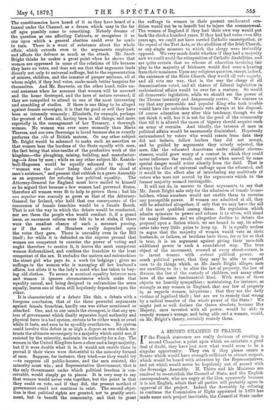lab DEBATE ON FEMALE SUFFRAGE.
THE worst feature about this Female Suffrage controversy in Parliament is its dilettante character. Mx. Jacob Bright is proposing a new Reform Bill of gigantic dimensions, a bill which would, sooner or later, involve the transfer of all power, whether legislative or executive, from men, who are the minority, to women, who are the majority of the population ; he secures an amount of support which would carry any ordinary measure ; and he provokes a division in which half the House takes part, and yet no leader on either side rises to speak ; the debate is fixed for Wednesday, the day sacred to philanthropic crotchets ; and the speakers, the mover ex- cepted, all affect an air of frisky jocularity. People outside hardly remember that the proposal is upon them ; serious poli- ticians are scarcely interested in the division ; and the mass of the electorate are not even aware that such a change has been seriously proposed. We do not believe that any human being could give a reasonable opinion as to the reception of Female Suffrage at the hustings, for this sufficient reason, that the electorate has as yet no opinion whatever on the matter, has not considered it as one of practical politics, and has therefore no decision to record. The constituencies have heard of it as they have heard of a tunnel under the Channel, as a dream which may in the far off ages possibly come to something. Nobody dreams of the question as one affecting Cabinets, or recognises it as one upon which a general election could ever be made to turn. There is a want of substance about the whole affair, which extends even to the arguments employed, and affects the defence as much as the attack. Mr. Jacob Bright thinks he makes a great point when he shows that women are oppressed in some of the relations of life because they have no votes, and does not see that that argument leads directly not only to universal suffrage, but to the representation of minors, children, and the inmates of pauper asylums, all of whom might, if they had votes, make much better bargains for themselves. And Mr. Bouverie, on the other hand, talks un- real nonsense when he assumes that women will be unsexed and the home destroyed, and the laws of nature reversed, if they are compelled to attend to one of the most interesting and ennobling of studies. If there is one thing to be alleged against female sovereigns, it is that for good or evil they have been so intensely womanly ; Elizabeth, for example, perhaps the greatest of them all, having been in all things, and more especially in the management of her Treasury, a thorough woman. No woman was ever more womanly than Maria Theresa, and our own Sovereign is loved because she so exactly performs the role of British matron. On any other subject Mr. Bright would be ashamed to make such an assertion as that women bear the burdens of the State equally with men, the fact being that nine-tenths of the productive work of the kingdom—the ploughing, mining, building, and manufactur- ing—is done by men ; while on any other subject Mr. Knatch- bull-Hugessen would be equally ashamed to say that "woman was the silver lining that gilded the cloud of man's existence," and present that rubbish to a grave Assembly as an argument for refusing her political equality. The Attorney-General for England must have smiled to himself as he argued that because a few women had governed States, therefore all women were fit to help to govern them ; but his non sequitur was scarcely as gross as that of the Attorney- General for Ireland, who held that one consequence of the concession of female franchise would be a female Bench. That is not the way in which the debate would be conducted, nor are these the people who would conduct it, if a grand issue, an enormous reform were felt to be at stake, if there were the smallest chance of such a measure passing, or if the seats of Members really depended upon the votes they gave. There is unreality even in the Bill itself ; for while it is defended on the express ground that women are competent to exercise the power of voting and ought therefore to receive it, it leaves the most competent women disfranchised, and confines the franchise to the least competent of the sex. It excludes the matron and enfranchises the street girl who pays 4s. a week for lodgings ; gives no suffrage to the woman who is managing all her husband's affairs, but allots it to the lady's maid who has taken to buy- ing old clothes. To secure a nominal equality between men and women it ignores circumstances which make that equality unreal, and being designed to enfranchise the sexes equally, leaves one of them still hopelessly dependent upon the other.
It is characteristic of a debate like this, a debate with a foregone conclusion, that of the three powerful arguments against female franchise, hardly one was either mentioned or attacked. One, and to our minds the strongest, is that any sys- tem of government which finally separates legal authority and physical force is a bad system, certain to be either weak or cruel while it lasts, and sure to be speedily overthrown. No system could involve this defect in so high a degree as one which en- trusts the ultimate sovereignty to a majority which could not, if resisted by the minority, maintain its authority for a day. The women in the United Kingdom have a clear and a large majority, but if it were double what it is, it would not enable them to prevail if their views were distasteful to the minority formed of men. Suppose, for instance, they tried—as they would try —to suppress all public-houses, and the men resisted, the minority must win ; and Representative Government, that is the only Government under which political freedom is con- ceivable, would simply go to pieces. It is very easy to say that women would never vote together, but the point is that they could so vote, and if they did, the present method of government could not continue to exist. The second objec- tion is that political rights are granted, not to gratify senti- ment, but to benefit the community, and that to grant the suffrage to women in their present uneducated con- dition would not be to benefit but to injure the commonweal. The women of England if they had their own way would put back the clock a hundred years. If they had had votes even fifty years ago, we could not have carried Catholic emancipation, or the repeal of the Test Acts, or the abolition of the Irish Church,. or any single measure to which the clergy were invincibly opposed. We very much doubt whether if they had a majority now we could avoid the reimposition of Catholic disabilities, and are quite certain that no scheme of education involving fair play to the majority of Irishmen would find even a hearing from their nominees. Upon any religious question, except, indeed,. the existence of the State Church, they would all vote eagerly, and all vote one way, that is, the way the clergy of all denominations voted, and all chance of Liberal legislation in ecclesiastical affairs would be over for a century. So would all democratic legislation, while we should see the power of the Throne instantly and dangerously revive. We venture to say that any personable and popular King who took trouble would have the unbroken female vote always at his disposal. Of course education may alter this tendency, though we de not think it will, but it is not for the good of the community that till it is altered the cause of bigotry should acquire such an army of recruits. And thirdly, the interest of men in political affairs would be enormously diminished. Hopelessly outnumbered by voters who would reason from data they did not believe, follow leaders they did not accept, and be guided by arguments they utterly rejected, the men, like the educated Americans under similar circum- stances, would grow weary of a contest in which they could never influence the result, and except when moved by some special danger would retire silently from the field. That is always the effect of universal suffrage upon the educated, and it would be the effect also of introducing any multitude of voters who were not moved by the arguments which to the former majority seemed irrefragable. It will not do, in answer to these arguments, to say that Mr. Jacob Bright asks only for the admission of female house- holders, whose numbers would not enable them to exercise any perceptible power. If women are admitted at all, they will be admitted altogether, if only that we may have the aid of the most qualified among them. No regulation which admits spinsters to power and refuses it to wives, will stand for many Sessions, and we altogether decline to debate the proposal upon a fiction which, we are bound to say, its advo- cates take very little pains to keep up. It is equally useless to argue that the majority of women would vote as their husbands, or fathers, or brothers bade them, for so far as that is true, it is an argument against giving their men-folk additional power in such a roundabout way. The true- object of the movement, avowed at every street-corner, is to invest women with serious political power, so much political power, that they may be able to compel men to do things which, as Mr. Jacob Bright alleges, men are unwilling to do ; to alter the law of property, the law of divorce, the law of the custody of children, and many other laws of the same fundamental kind. With some of these objects we heartily sympathise ; maintaining, for instance, as strongly as any woman in England, that our law of property is, as regards women, iniquitous ; that they are the daily victims of legalised theft ; but are we to remedy that wrong by a radical transfer of the whole power of the State ? We might just as well declare the Queen absolute, because Her Majesty, once invested with all power, would be able to remedy women's wrongs, and being able and a woman, would,. on Mr. Bright's theory, certainly remedy them.



































 Previous page
Previous page